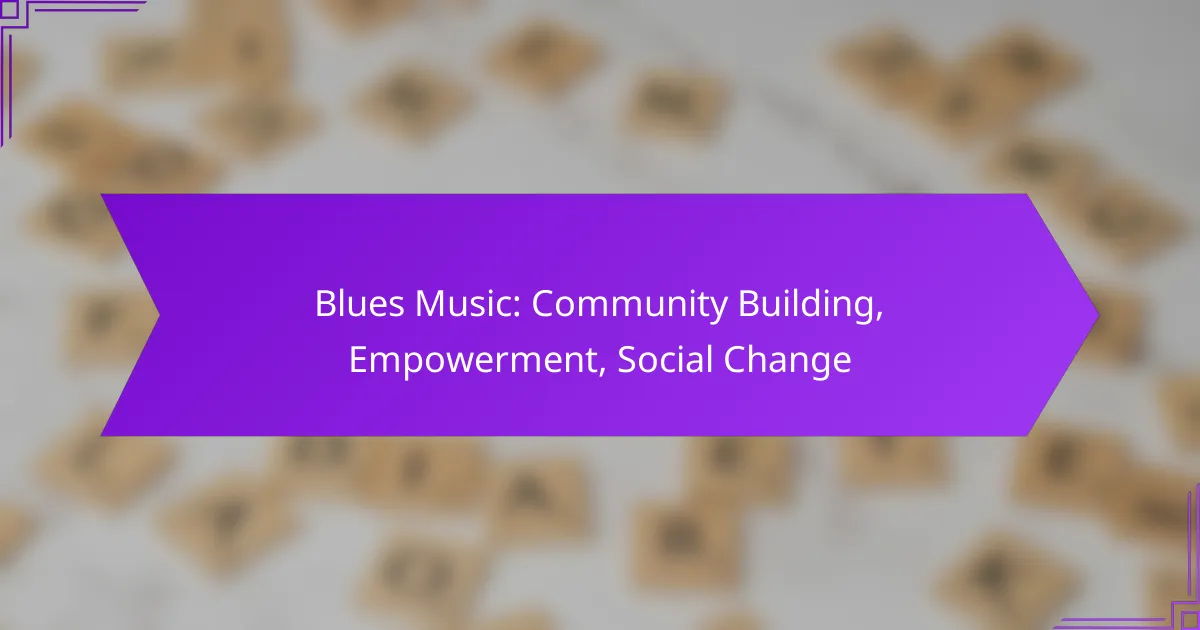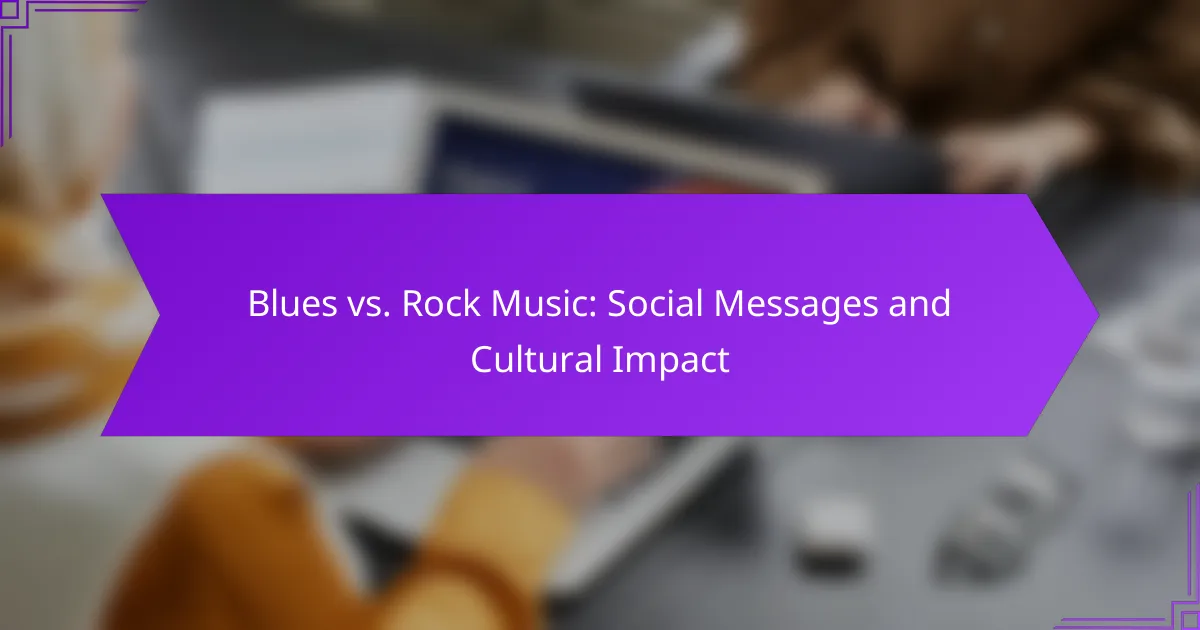Blues music has been a vital force in shaping civil rights movements, giving voice to the struggles and aspirations of marginalized communities. Its poignant lyrics and emotional resonance not only raise awareness of social injustices but also foster resilience and unity among listeners, making it a powerful medium for social change.
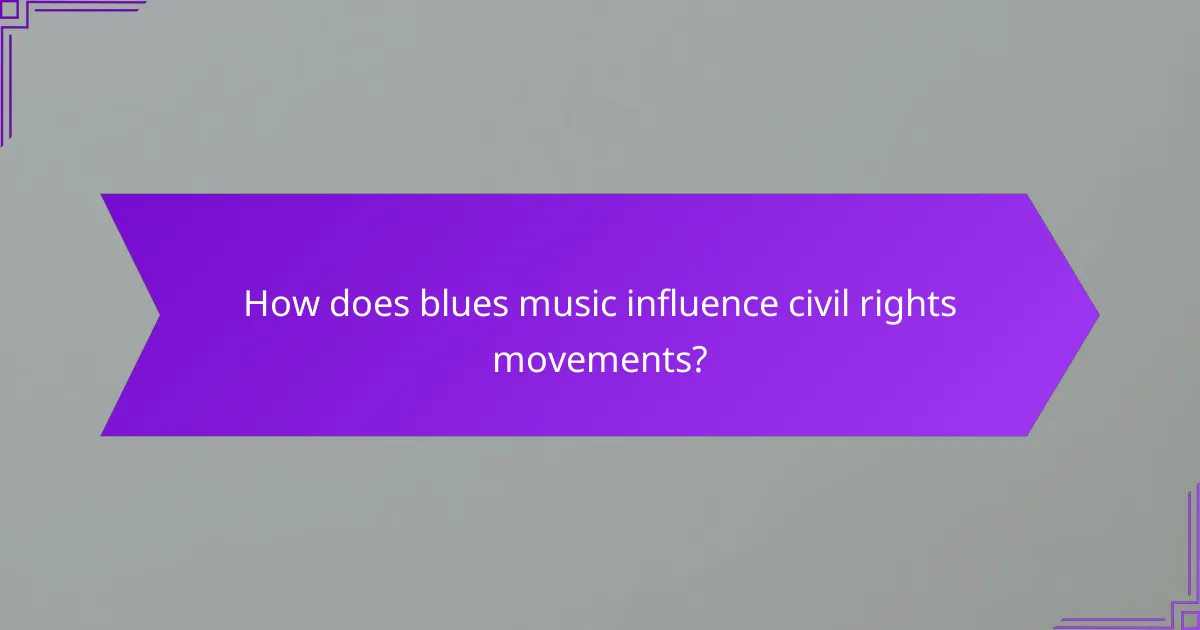
How does blues music influence civil rights movements?
Blues music has played a crucial role in influencing civil rights movements by articulating the struggles and aspirations of marginalized communities. Through its powerful lyrics and emotional depth, blues has served as a voice for social change, helping to raise awareness and mobilize support for civil rights issues.
Historical significance of blues in activism
The blues emerged in the late 19th and early 20th centuries, rooted in African American experiences of oppression and resilience. This genre became a platform for expressing social injustices, particularly during the Jim Crow era, when segregation and discrimination were rampant in the United States. Blues songs often highlighted the struggles faced by African Americans, making them a vital part of the cultural landscape of activism.
During the civil rights movement of the 1950s and 1960s, blues music was instrumental in rallying support and fostering a sense of community among activists. The genre not only provided a soundtrack for protests but also inspired a sense of unity and purpose among those fighting for equality.
Key artists and their contributions
Notable blues artists have made significant contributions to civil rights activism through their music. For instance, B.B. King and Muddy Waters used their platforms to address social issues and advocate for change. Their songs often contained messages of hope and resilience, resonating with audiences and encouraging them to engage in the fight for civil rights.
Additionally, artists like Billie Holiday and Nina Simone incorporated blues elements into their work, using their voices to speak out against racial injustice. Holiday’s “Strange Fruit,” while more jazz-oriented, is deeply rooted in the blues tradition and powerfully addresses the horrors of lynching, making it a poignant protest song of its time.
Impact on protest songs
The influence of blues music on protest songs is profound, as many civil rights anthems draw inspiration from its themes and musical structure. Blues has a unique ability to convey deep emotions, making it an effective vehicle for expressing the pain and anger associated with social injustices. This emotional resonance has led to the creation of numerous protest songs that echo the sentiments of the blues tradition.
Many contemporary protest songs continue to reflect the blues’ legacy, incorporating its rhythms and lyrical styles to address ongoing issues such as racial inequality and social injustice. Artists today often pay homage to the blues by blending its elements with modern genres, ensuring that the spirit of activism remains alive in music.
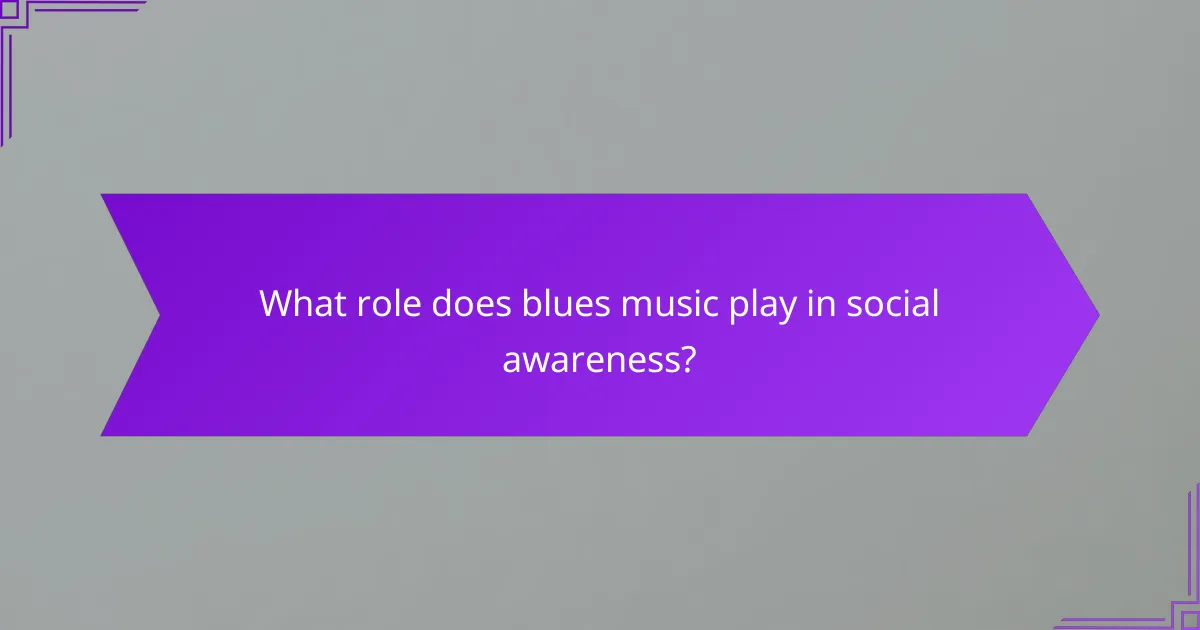
What role does blues music play in social awareness?
Blues music serves as a powerful medium for social awareness by highlighting issues of inequality and injustice. Through its lyrics and themes, it reflects the struggles of marginalized communities and fosters a sense of resilience and hope.
Messages of inequality and resilience
The blues genre has deep roots in the African American experience, often addressing themes of racial discrimination and social injustice. Artists use their music to convey personal and collective struggles, creating a narrative that resonates with listeners facing similar challenges.
Many blues songs capture the emotional weight of hardship while simultaneously celebrating the strength to overcome adversity. This duality not only raises awareness about societal issues but also inspires listeners to persevere in the face of difficulties.
Modern artists addressing social issues
Contemporary blues musicians continue to address pressing social issues through their work. Artists like Gary Clark Jr. and Shemekia Copeland incorporate themes of police brutality, economic disparity, and systemic racism into their lyrics, making their music relevant to today’s societal landscape.
These modern blues artists often collaborate with other genres, such as rock and hip-hop, to reach wider audiences and amplify their messages. By blending styles, they not only preserve the essence of blues but also ensure its role in advocating for social change remains strong.
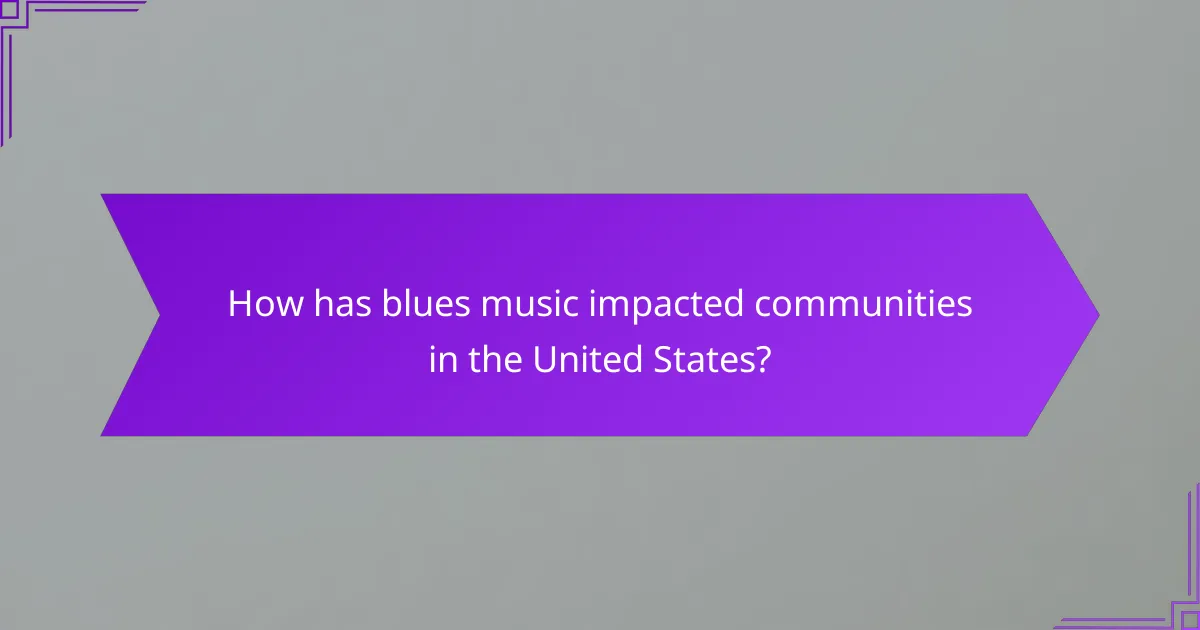
How has blues music impacted communities in the United States?
Blues music has significantly influenced communities in the United States by fostering social awareness and promoting civil rights. It serves as a powerful medium for expressing the struggles and triumphs of marginalized groups, creating a sense of unity and identity among listeners.
Community building through music
Blues music plays a vital role in community building by bringing people together through shared experiences and cultural expression. Local venues, such as clubs and community centers, often host blues performances that encourage social interaction and collaboration among diverse groups.
Moreover, blues music festivals and events provide opportunities for community members to engage in cultural exchange, fostering a sense of belonging and pride. These gatherings often feature local artists, creating a platform for emerging talent and strengthening community ties.
Economic benefits of blues festivals
Blues festivals can have significant economic benefits for local communities by attracting tourists and generating revenue. These events often draw thousands of attendees, which boosts sales for local businesses such as restaurants, hotels, and shops.
Additionally, festivals create job opportunities for local residents, from event planning to hospitality services. Communities can leverage the popularity of blues music to enhance their economic landscape, making it a strategic focus for local development initiatives.
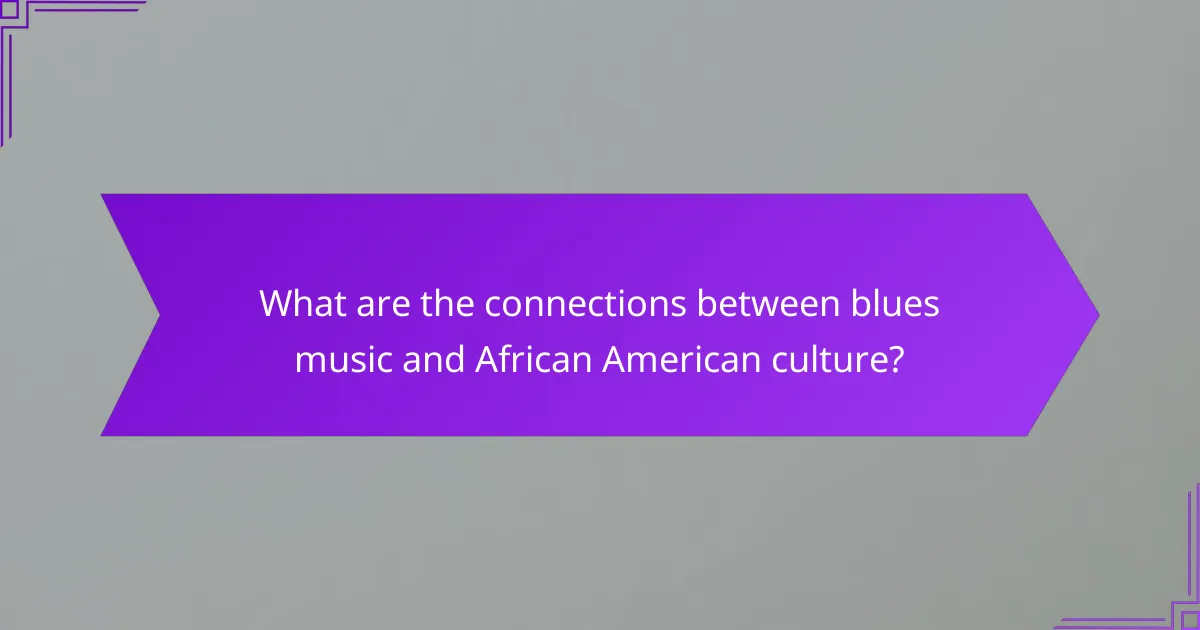
What are the connections between blues music and African American culture?
Blues music is deeply intertwined with African American culture, serving as a powerful expression of the community’s struggles, resilience, and identity. It reflects historical experiences, social issues, and the emotional landscape of African Americans, making it a vital cultural artifact.
Roots of blues in African traditions
The roots of blues music can be traced back to African musical traditions brought to America by enslaved Africans. These traditions included call-and-response patterns, rhythmic complexity, and the use of improvisation, which became foundational elements of the blues genre.
Incorporating spirituals, work songs, and folk tales, early blues artists conveyed their experiences and emotions, often addressing themes of hardship, love, and social injustice. This blend of African heritage and American experience created a unique musical form that resonated with the community.
Influence on other music genres
Blues music has significantly influenced a variety of other genres, including jazz, rock and roll, and rhythm and blues. The emotional depth and structural elements of blues laid the groundwork for these styles, allowing them to evolve while retaining a connection to their roots.
Artists across genres have drawn inspiration from blues, incorporating its themes and musical techniques into their work. For example, rock legends like Eric Clapton and the Rolling Stones have credited blues musicians such as B.B. King and Muddy Waters as major influences on their sound, showcasing the genre’s lasting impact on music worldwide.
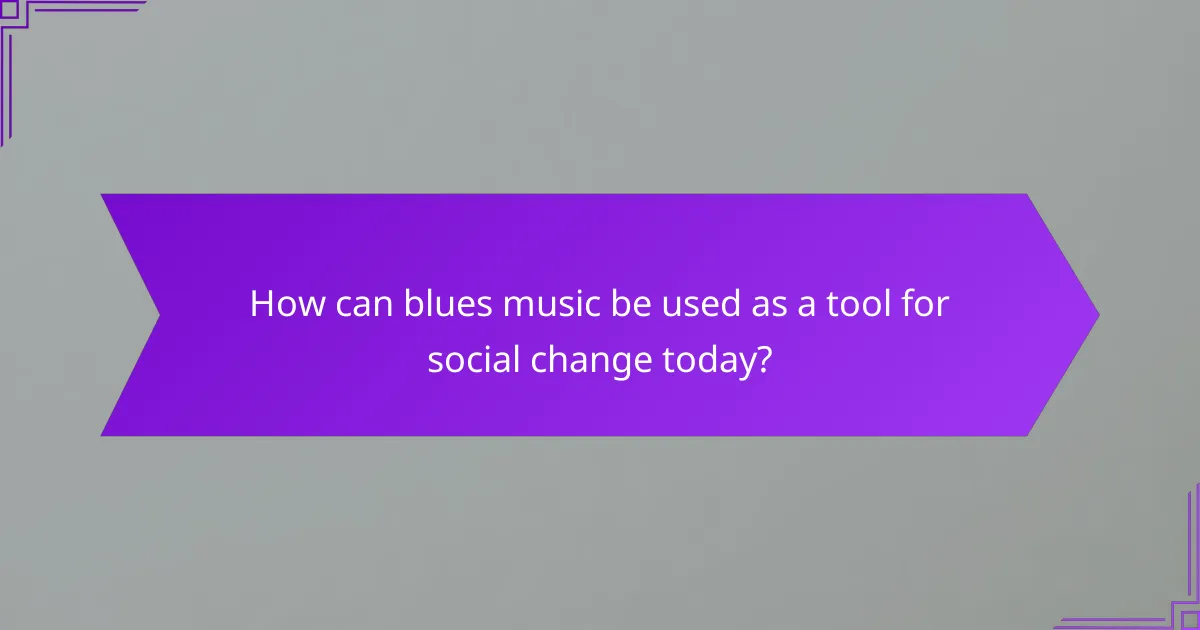
How can blues music be used as a tool for social change today?
Blues music can serve as a powerful tool for social change by raising awareness of social issues and fostering community engagement. Through its rich history of addressing struggles and injustices, blues can inspire activism and promote dialogue around contemporary challenges.
Educational programs in schools
Incorporating blues music into educational programs can enhance students’ understanding of history and social justice. Schools can offer workshops that explore the genre’s roots in the Civil Rights Movement, encouraging students to connect with the music’s themes of resilience and resistance.
Programs can include hands-on activities such as songwriting, where students create their own blues songs reflecting current social issues. This not only fosters creativity but also promotes critical thinking and empathy among young learners.
Community outreach initiatives
Community outreach initiatives using blues music can unite diverse groups and spark conversations about social change. Local organizations can host blues festivals or concerts that feature artists who address relevant social themes, drawing attention to community issues.
Additionally, workshops and open mic events can provide a platform for local voices, allowing community members to share their stories through blues music. These initiatives can strengthen community bonds and encourage collective action toward social justice goals.
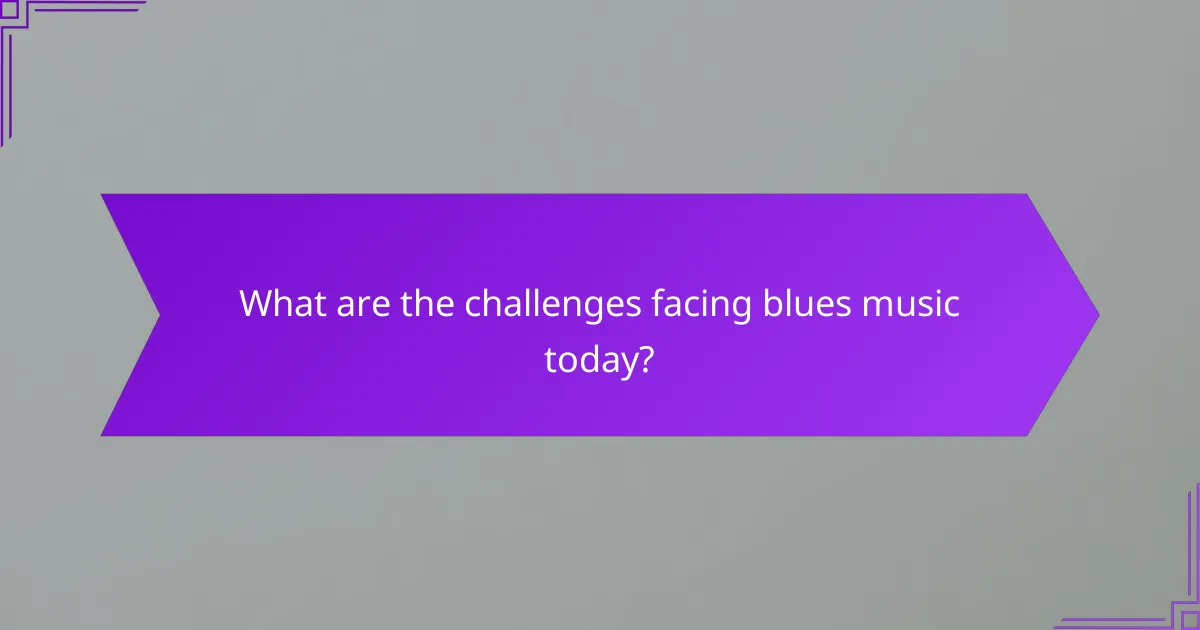
What are the challenges facing blues music today?
Blues music faces several challenges today, including the preservation of traditional styles and the impact of commercialization on authenticity. These issues threaten the genre’s cultural roots and its ability to resonate with new audiences.
Preservation of traditional styles
The preservation of traditional blues styles is crucial for maintaining the genre’s authenticity. Many contemporary artists are influenced by various genres, which can dilute the original sound and storytelling elements that define blues music.
Efforts to preserve traditional styles include workshops, festivals, and educational programs that focus on the history and techniques of blues music. Community initiatives can help engage younger musicians and encourage them to explore and respect the roots of the genre.
Commercialization and authenticity
Commercialization poses a significant challenge to blues music, often prioritizing marketability over artistic integrity. This can lead to a homogenization of sound, where unique voices are overshadowed by mainstream trends.
Artists and producers should strive for a balance between commercial success and staying true to the blues’ rich heritage. Supporting independent labels and local musicians can help maintain the authenticity of the genre while still reaching broader audiences.

